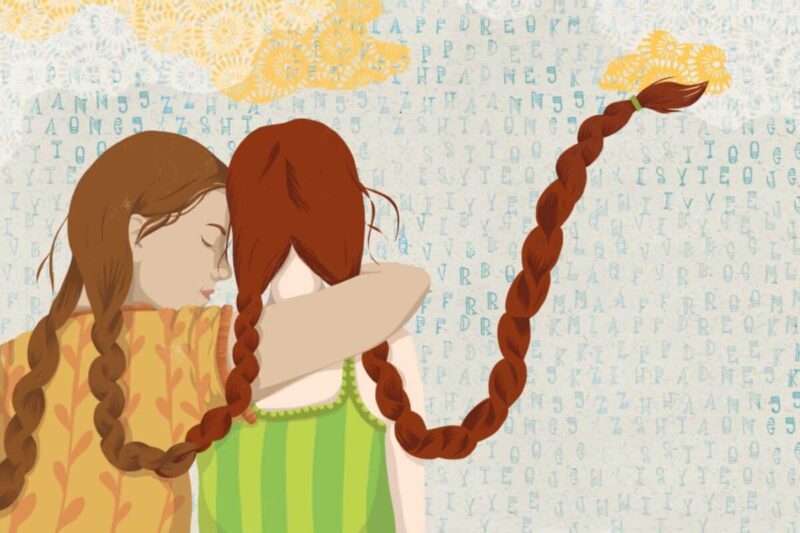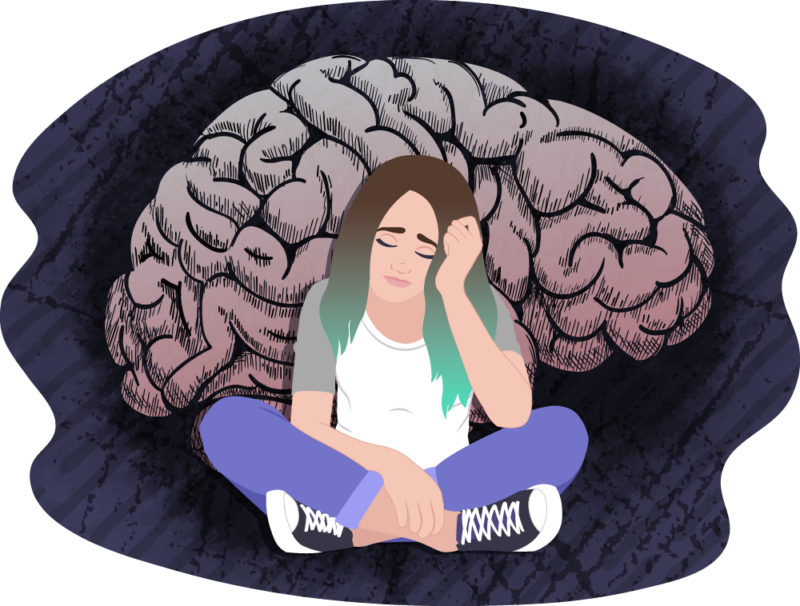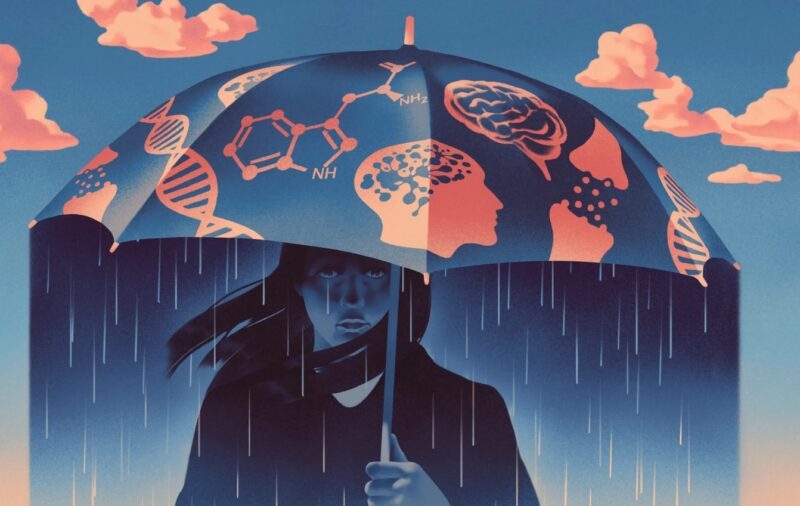Depression is a complex and often misunderstood mental health condition that affects millions of people worldwide. It is characterized by persistent feelings of sadness, hopelessness, and a loss of interest in activities that were once enjoyed. While everyone experiences moments of sadness and despair, depression is a chronic condition that can have a profound impact on a person’s overall well-being.
In this comprehensive guide, we will delve deep into the world of depression, exploring its causes, symptoms, and treatment options, while providing practical advice on how to manage and overcome this silent struggle.
What is Depression?
Depression, also referred to as major depressive disorder (MDD), is a mental health condition that affects a person’s mood, thoughts, and behaviors. It goes beyond ordinary sadness or temporary feelings of unhappiness, persisting for extended periods and significantly impacting daily life. Individuals with depression often experience a deep sense of despair and may struggle to find joy or pleasure in activities they once enjoyed.

HelpGuide
Understanding the Causes
Depression is a multifaceted condition with various contributing factors. While the exact cause of depression is unknown, several factors are believed to play a role:
- Genetics: Research suggests that there may be a genetic predisposition to depression. Individuals with a family history of the condition are more likely to develop it themselves.
- Biochemical Imbalances: Certain neurotransmitters, such as serotonin, dopamine, and norepinephrine, are involved in regulating mood. Imbalances in these chemicals can contribute to the development of depression.
- Environmental Factors: Traumatic life events, such as the loss of a loved one, abuse, or financial difficulties, can trigger. Additionally, chronic stress and ongoing life challenges can contribute to its onset.
- Medical Conditions: Certain medical conditions, such as chronic pain, hormonal imbalances, or thyroid disorders, can increase the risk of developing depression.
- Personality Factors: Individuals with low self-esteem, a pessimistic outlook on life, or a history of anxiety are more susceptible to depression.
Common Symptoms
Depression manifests differently in each individual, but some common symptoms include:
- Persistent feelings of sadness or emptiness
- Loss of interest in activities and hobbies
- Fatigue and decreased energy levels
- Changes in appetite and weight
- Sleep disturbances, such as insomnia or oversleeping
- Difficulty concentrating or making decisions
- Feelings of worthlessness or excessive guilt
- Recurrent thoughts of death or suicide
It is important to note that depression is a serious condition and should not be self-diagnosed. If you or someone you know is experiencing these symptoms, seeking professional help from a qualified mental health practitioner is crucial.
Understanding Different Types of Depression
Depression is not a one-size-fits-all condition. It can manifest in various forms, each with its own unique characteristics. Understanding the different types of depression can help individuals seek appropriate treatment and support.

Centric Mental Health
1. Major Depressive Disorder (MDD)
Major Depressive Disorder, also known as clinical depression, is the most common form of depression. It is characterized by persistent feelings of sadness, loss of interest, and a significant decline in functioning. MDD often interferes with a person’s ability to carry out daily activities, work, or maintain relationships.
2. Persistent Depressive Disorder (PDD)
Persistent Depressive Disorder, formerly known as dysthymia, is a chronic form of depression that lasts for at least two years. People with PDD may experience periods of mild to moderate depression interspersed with brief periods of normal mood.
3. Postpartum Depression (PPD)
Postpartum Depression occurs in some women after giving birth. It is attributed to hormonal changes, emotional adjustment, and the demands of caring for a newborn. PPD can affect the mother’s ability to bond with her baby and may require treatment to ensure the well-being of both mother and child.
4. Seasonal Affective Disorder (SAD)
Seasonal Affective Disorder is a type of depression that occurs with the change of seasons, typically in fall and winter. It is thought to be related to reduced exposure to sunlight and disrupted circadian rhythms. Symptoms of SAD include low energy, increased sleep, weight gain, and social withdrawal.
5. Bipolar Disorder
Bipolar Disorder, previously known as manic depression, is characterized by alternating periods of depression and mania. During manic episodes, individuals experience elevated mood, increased energy, and impulsive behavior. Bipolar Disorder requires specialized treatment to manage both depressive and manic symptoms.
Diagnosing Depression: When to Seek Help
Depression can often go undiagnosed due to societal stigma or lack of awareness. However, seeking help from a healthcare professional is essential for accurate diagnosis and appropriate treatment. If you or someone you know is experiencing the following symptoms for an extended period, it is advisable to consult a mental health professional:

Kids Helpline
- Persistent feelings of sadness, hopelessness, or emptiness that last for weeks or longer.
- Loss of interest in activities once enjoyed.
- Significant changes in appetite and weight.
- Sleep disturbances, including insomnia or excessive sleepiness.
- Fatigue or loss of energy.
- Difficulty concentrating or making decisions.
- Feelings of worthlessness or excessive guilt.
- Recurrent thoughts of death or suicide.
Remember, depression is a treatable condition, and seeking help is a sign of strength.
Treatment Options
Treating depression often requires a comprehensive approach that may include a combination of therapies, lifestyle changes, and medication. It is important to work closely with a healthcare professional to determine the most suitable treatment plan for each individual.

British GQ
1. Psychotherapy
Psychotherapy, also known as talk therapy, is a fundamental treatment modality for depression. It involves working with a trained therapist to explore and address the underlying causes of depression. Cognitive-behavioral therapy (CBT) is one common approach that helps individuals identify and modify negative thought patterns and behaviors.
2. Medication
In some cases, medication may be prescribed to alleviate the symptoms of depression. Antidepressants, such as selective serotonin reuptake inhibitors (SSRIs), serotonin-norepinephrine reuptake inhibitors (SNRIs), or tricyclic antidepressants (TCAs), can help regulate neurotransmitter levels in the brain. It is important to note that medication should always be taken under the guidance of a qualified healthcare professional.
3. Lifestyle Changes
Making positive lifestyle changes can greatly contribute to managing and overcoming depression. Here are some strategies to consider:
- Regular exercise: Engaging in physical activity releases endorphins, the body’s natural mood boosters.
- Healthy diet: Consuming a well-balanced diet rich in fruits, vegetables, whole grains, and lean proteins can support overall mental well-being.
- Sufficient sleep: Prioritize getting enough sleep each night, as sleep disturbances can worsen depressive symptoms.
- Stress management: Implement stress-reduction techniques such as mindfulness meditation, deep breathing exercises, or engaging in hobbies that promote relaxation.
- Social support: Surround yourself with a supportive network of friends and family who can offer encouragement and understanding.
Combining these lifestyle changes with professional treatment can lead to significant improvements in depressive symptoms.
Also read: 6 Healthy Habits You Should Start Today

Quanta Magazine
Frequently Asked Questions (FAQs)
Q1: Can depression go away on its own without treatment?
A1: While mild cases of depression may improve over time, it is generally not recommended to rely solely on the hope that depression will resolve without treatment. Seeking professional help greatly increases the chances of successful management and recovery.
Q2: Is depression a sign of weakness?
A2: No, depression is not a sign of weakness. It is a legitimate medical condition that affects individuals from all walks of life. Seeking help for depression demonstrates courage and a desire for a better quality of life.
Q3: Can I overcome depression without medication?
A3: In some cases, mild to moderate depression can be effectively managed without medication. However, it is crucial to consult with a healthcare professional to determine the most appropriate treatment plan for your specific situation.
Q4: How long does it take for antidepressants to work?
A4: Antidepressants typically take several weeks to start producing noticeable effects. It is important to continue taking medication as prescribed and to follow up regularly with your healthcare provider to assess progress.
Q5: Can lifestyle changes alone cure depression?
A5: While positive lifestyle changes can significantly contribute to managing depression, they may not be sufficient to cure the condition entirely. A comprehensive approach that includes therapy, medication, and lifestyle adjustments is often the most effective course of action.
Q6: How can I support a loved one with depression?
A6: Supporting a loved one with depression involves being patient, understanding, and offering a listening ear. Encourage them to seek professional help and provide emotional support throughout their journey.
Conclusion
Depression is a challenging and often overwhelming condition, but with the right support and treatment, it is possible to overcome its grip. Remember that you are not alone in this journey, and seeking help is a brave and necessary step toward healing.
If you or someone you know is struggling with depression, reach out to a mental health professional and explore the available resources.
Together, we can break the silence surrounding depression and foster a world of understanding and support.








